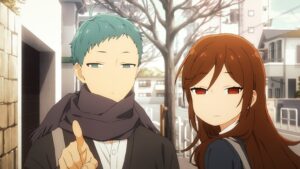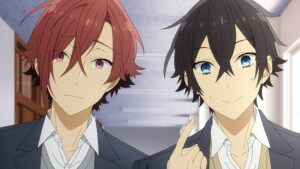Sometimes it feels good to be anime-only. Everywhere you look, people are complaining about the cut content in Horimiya’s adaptation, and I’m just sitting here in blissful ignorance. The anime has never saddled itself with a particular schedule that must be followed at all costs – it tells short stories about whomever it wants, whenever it wants. That’s been evident in plenty of past episodes, but it was also clear in these two most recent ones. Miyamura’s reconciliation with a former bully, which was the show’s main focus two weeks ago? It only surfaces in episode 10 long enough to support a gag about his potential bisexuality. Remember Sawada, Miyamura’s neighbor from week six? She wasn’t given another appearance until this latest airing, and even that was frivolous in comparison to the tragedy of her brother’s passing (which was revealed over a month ago). Apart from the trajectory of its two protagonists, Horimiya has never been a particularly disciplined series on a narrative level – that patchwork feel is part of its charm. It did manage to fix its gaze on a small set of characters last week, though, in the resolution (?) of the Ishikawa love triangle.
The choice to tell that story from Yuki’s point of view probably wasn’t an intuitive one, as she removes herself from the show’s school setting for a good part of it. Ishikawa is the one caught between two girls’ affections, and he stays there for a while, making him an easier fulcrum on which to balance all three kids’ feelings. But you know, I really liked the route we got. Yuki’s reservations about expressing herself came across as mild in the past (not taking the last copy of a book in a bookstore, whoop-de-doo), but that trait was rescued by the focus on her character in episode 10. After realizing that her pretend relationship was hurting Sakura, she went so far as to remove herself from the equation, staying home from school and asking Remi to pass messages for her. The camera stayed with Yuki through all of that, so we didn’t get to see Sakura’s big confession, but that just made the news of that moment all the more dramatic. We lacked both context and conclusive information, so it was easier to feel Yuki’s nerves when she returned to school, and her relief that Ishikawa hadn’t slipped away from her.
Horimiya did a lot more to support this story than temporarily dialing in on one character. It introduced Yuki’s older sister, who looks out for her little sis, but views her as unremarkable. That aloofness formed a subtle basis for Yuki’s lack of self-esteem, which in turn made her withdrawal from a difficult situation feel much more real. The show also did some great work with filters and effects during introspective moments. Darkening half the frame during her recollection of her lie to Sakura created the vibe that her memory had been stained by disgust. Once she talked to Ishikawa on the rooftop, the glimpses into her mind’s eye were bathed in a honey color instead, visualizing the warmth that starts in the pit of your stomach when you realize someone reciprocates your feelings. I’m not generally a fan of post-processing techniques that impact the entire screen, but Horimiya has done some nice work on that front this season. The rooftop scene could have been even better, though, if the dialogue hadn’t been so blatant about the characters’ names representing different seasons. If even I found this overbearing despite not knowing Japanese, I can’t imagine how native speakers managed to tolerate it.
I’ve got a lot less to say about episode 11, which offered up a slew of jokes in lieu of actual character building. My brain started powering down during the conversation about Akane’s polite speech and use of family names, which was around the five minute mark, and I couldn’t be bothered to rewind and catch any of the lines I missed. It’s not as though every single joke flopped – I liked this visual gag of Yuki shielding her straw from Shu’s germs – but I’ve got to say that Akane’s present incorporation is far less funny than his initial introduction as a nearsighted ikemen. As for the second half of the episode, Shu’s sudden prominence threw me for a loop and a half. Until this point in the show he’s been a virtual non-entity, averaging a single line per week. There’s been no groundwork laid for his normal persona, much less his secret intensity at home, making the series’ sudden interest in his home life feel strange. Maybe it’s a Shu-related story that manga readers are upset has been excluded from the anime, because I can’t see him growing on me with only two episodes to go.




